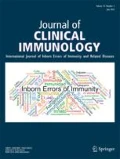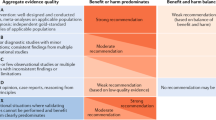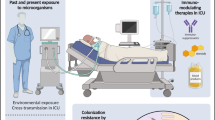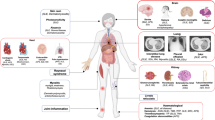Abstract
Vancomycin has been shown to affect tumor necrosis factor-alpha (TNF-α) pathways as an immunomodulator; this is thought to be separate from its function as an antibiotic [1]. Previous studies have shown that oral vancomycin (OV) is an effective treatment for concomitant primary sclerosing cholangitis (PSC) and inflammatory bowel disease (IBD) in children [2, 3]. Since both diseases are associated with immune dysfunction, we hypothesized that vancomycin’s therapeutic effect in IBD and PSC occurs through immunomodulation. Therefore, we examined the in vivo immunological changes that occur during OV treatment of 14 children with PSC and IBD. Within 3 months of OV administration, peripheral gamma-glutamyl transpeptidase (GGT) and alanine aminotransferase (ALT) concentrations, white blood cell (WBC) counts, and neutrophil counts normalized from elevated levels before treatment. Patients also demonstrated improved biliary imaging studies, liver biopsies and IBD symptoms and biopsies. Additionally, plasma transforming growth factor beta (TGF-β) levels were increased without concurrent shifts in Th1-or Th2-associated cytokine production. Peripheral levels of CD4 + CD25hiCD127lo and CD4 + FoxP3+ regulatory T (Treg) cells also increased in OV-treated PSC + IBD patients compared to pretreatment levels. A unique case study shows that the therapeutic effects of OV in the treatment of PSC + IBD do not always endure after OV discontinuation, with relapse of PSC associated with a decrease in blood Treg levels; subsequent OV retreatment was then associated with a rise in blood Treg levels and normalization of liver function tests (LFTs). Taken together, these studies support immune-related pathophysiology of PSC with IBD, which is responsive to OV.




Similar content being viewed by others
References
Howden BP, Smith DJ, Mansell A, Johnson PD, Ward PB, Stinear TP, et al. Different bacterial gene expression patterns and attenuated host immune responses are associated with the evolution of low-level vancomycin resistance during persistent methicillin-resistant Staphylococcus aureus bacteraemia. BMC Microbiol. 2008;8:39. doi:10.1186/1471-2180-8-39.
Cox KL, Cox KM. Oral vancomycin: Treatment of primary sclerosing cholangitis in children with inflammatory bowel disease. J Pediatr Gastroenterol Nutr. 1998;27(5):580–3.
Davies YK, Cox KM, Abdullah BA, Safta A, Terry AB, Cox KL. Long-term treatment of primary sclerosing cholangitis in children with oral vancomycin: an immunomodulating antibiotic. J Pediatr Gastroenterol Nutr. 2008;47(1):61–7. doi:10.1097/MPG.0b013e31816fee95.
Mieli-Vergani GaDV. Unique features of primary sclerosing cholangitis in children. Curr Opin Gastroenterol.26(3):4.
Bowlus CL. Cutting edge issues in primary sclerosing cholangitis. Clin Rev Allergy Immunol. 2011;41(2):139–50. doi:10.1007/s12016-010-8221-3.
Hov JR, Kosmoliaptsis V, Traherne JA, Olsson M, Boberg KM, Bergquist A, et al. Electrostatic modifications of the human leukocyte antigen-DR P9 peptide-binding pocket and susceptibility to primary sclerosing cholangitis. Hepatology. 2011;53(6):1967–76. doi:10.1002/hep. 24299.
Karlsen TH, Franke A, Melum E, Kaser A, Hov JR, Balschun T, et al. Genome-wide association analysis in primary sclerosing cholangitis. Gastroenterology. 2010;138(3):1102–11. doi:10.1053/j.gastro.2009.11.046.
Melum E, Franke A, Schramm C, Weismuller TJ, Gotthardt DN, Offner FA, et al. Genome-wide association analysis in primary sclerosing cholangitis identifies two non-HLA susceptibility loci. Nat Genet. 2011;43(1):17–9. doi:10.1038/ng.728.
Ochoa-Reparaz J, Mielcarz DW, Ditrio LE, Burroughs AR, Foureau DM, Haque-Begum S, et al. Role of gut commensal microflora in the development of experimental autoimmune encephalomyelitis. J Immunol. 2009;183(10):6041–50. doi:10.4049/jimmunol.0900747.
Ivanov, II, Frutos Rde L, Manel N, Yoshinaga K, Rifkin DB, Sartor RB et al. Specific microbiota direct the differentiation of IL-17-producing T-helper cells in the mucosa of the small intestine. Cell host & microbe. 2008;4(4):337–49. doi:10.1016/j.chom.2008.09.009
Wu HJ, Ivanov II, Darce J, Hattori K, Shima T, Umesaki Y, et al. Gut-residing segmented filamentous bacteria drive autoimmune arthritis via T helper 17 cells. Immunity. 2010;32(6):815–27. doi:10.1016/j.immuni.2010.06.001.
Lathrop SK, Bloom SM, Rao SM, Nutsch K, Lio CW, Santacruz N, et al. Peripheral education of the immune system by colonic commensal microbiota. Nature. 2011;478(7368):250–4. doi:10.1038/nature10434.
Josefowicz SZ, Niec RE, Kim HY, Treuting P, Chinen T, Zheng Y, et al. Extrathymically generated regulatory T cells control mucosal TH2 inflammation. Nature. 2012;482(7385):395–9. doi:10.1038/nature10772.
Atarashi K, Tanoue T, Shima T, Imaoka A, Kuwahara T, Momose Y, et al. Induction of colonic regulatory T cells by indigenous Clostridium species. Science. 2011;331(6015):337–41. doi:10.1126/science.1198469.
Strauch UG, Obermeier F, Grunwald N, Gurster S, Dunger N, Schultz M, et al. Influence of intestinal bacteria on induction of regulatory T cells: Lessons from a transfer model of colitis. Gut. 2005;54(11):1546–52. doi:10.1136/gut.2004.059451.
Round JL, Mazmanian SK. Inducible Foxp3+ regulatory T-cell development by a commensal bacterium of the intestinal microbiota. Proc Natl Acad Sci U S A. 2010;107(27):12204–9. doi:10.1073/pnas.0909122107.
Liu B, Tonkonogy SL, Sartor RB. Antigen-presenting cell production of IL-10 inhibits T-helper 1 and 17 cell responses and suppresses colitis in mice. Gastroenterology. 2011;141(2):653–62. doi:10.1053/j.gastro.2011.04.053. 62 e1-4.
Nguyen KD, Vanichsarn C, Fohner A, Nadeau KC. Selective deregulation in chemokine signaling pathways of CD4+CD25(hi)CD127(lo)/(−) regulatory T cells in human allergic asthma. J Allergy Clin Immunol. 2009;123(4):933–9. doi:10.1016/j.jaci.2008.11.037. e10.
Siedlar M, et al. Vancomycin down-regulates lipopolysaccharide-induced tumour necrosis factor alpha (TNF alpha) production and TNF alpha-mRNA accumulation in human blood monocytes. Immunopharmacology. 1997;35(3):7.
Liu W, Putnam AL, Xu-Yu Z, Szot GL, Lee MR, Zhu S, et al. CD127 expression inversely correlates with FoxP3 and suppressive function of human CD4+ T reg cells. J Exp Med. 2006;203(7):1701–11. doi:10.1084/jem.20060772.
Lichtman SN, Okoruwa EE, Keku J, Schwab JH, Sartor RB. Degradation of endogenous bacterial cell wall polymers by the muralytic enzyme mutanolysin prevents hepatobiliary injury in genetically susceptible rats with experimental intestinal bacterial overgrowth. J Clin Investig. 1992;90(4):1313–22. doi:10.1172/JCI115996.
Lichtman SN, Sartor RB, Keku J, Schwab JH. Hepatic inflammation in rats with experimental small intestinal bacterial overgrowth. Gastroenterology. 1990;98(2):414–23.
Yoshimura A, Wakabayashi Y, Mori T. Cellular and molecular basis for the regulation of inflammation by TGF-beta. J Biochem. 2010;147(6):781–92. doi:10.1093/jb/mvq043.
Chen W, Jin W, Hardegen N, Lei KJ, Li L, Marinos N, et al. Conversion of peripheral CD4 + CD25- naive T cells to CD4 + CD25+ regulatory T cells by TGF-beta induction of transcription factor Foxp3. J Exp Med. 2003;198(12):1875–86. doi:10.1084/jem.20030152.
Fu S, Zhang N, Yopp AC, Chen D, Mao M, Chen D, et al. TGF-beta induces Foxp3 + T-regulatory cells from CD4 + CD25 - precursors. Am J Transplant. 2004;4(10):1614–27. doi:10.1111/j.1600-6143.2004.00566.x.
Sakaguchi S, Yamaguchi T, Nomura T, Ono M. Regulatory T cells and immune tolerance. Cell. 2008;133(5):775–87. doi:10.1016/j.cell.2008.05.009.
Kim YM, Munoz A, Hwang PH, Nadeau KC. Migration of regulatory T cells toward airway epithelial cells is impaired in chronic rhinosinusitis with nasal polyposis. Clin Immunol. 2010;137(1):111–21. doi:10.1016/j.clim.2010.05.013.
Nguyen KD, Vanichsarn C, Nadeau KC. Impaired IL-10-dependent induction of tolerogenic dendritic cells by CD4 + CD25hiCD127lo/- natural regulatory T cells in human allergic asthma. Am J Respir Crit Care Med. 2009;180(9):823–33. doi:10.1164/rccm.200905-0761OC.
Nguyen KD, Vanichsarn C, Nadeau KC. TSLP directly impairs pulmonary Treg function: association with aberrant tolerogenic immunity in asthmatic airway. Allergy Asthma Clin Immunol. 2010;6(1):4. doi:10.1186/1710-1492-6-4.
Schmetterer KG, Neunkirchner A, Pickl WF. Naturally occurring regulatory T cells: Markers, mechanisms, and manipulation. Faseb J. 2012;26(6):2253–76. doi:10.1096/fj.11-193672.
Kuhn R, Lohler J, Rennick D, Rajewsky K, Muller W. Interleukin-10-deficient mice develop chronic enterocolitis. Cell. 1993;75(2):263–74.
Rubtsov YP, Rasmussen JP, Chi EY, Fontenot J, Castelli L, Ye X, et al. Regulatory T cell-derived interleukin-10 limits inflammation at environmental interfaces. Immunity. 2008;28(4):546–58. doi:10.1016/j.immuni.2008.02.017.
Hessle C, Andersson B, Wold AE. Gram-positive bacteria are potent inducers of monocytic interleukin-12 (IL-12) while gram-negative bacteria preferentially stimulate IL-10 production. Infect Immun. 2000;68(6):3581–6.
Acknowledgements
The project described in this publication was supported by the Stanford NIH/NCRR CTSA award number UL1 RR025744 and by the Lucile Packard Foundation for Children’s Health. The authors would like to thank the families of the Lucile Packard Foundation for Child Health, the Wadsworth family, the Stanford Digestive Disease Center, and the Human Immune Monitoring Core of Stanford University for their generous support of these studies. The authors would additionally like to acknowledge the following individuals for their assistance with this report: Katharine Eng, M.D., Cameron McDonald-Hyman, and Ruhi Nath.
Sources of support
Stanford NIH/NCRR CTSA Award Number UL1 RR025744 (Cox); Lucile Packard Foundation for Child Health (Cox); Stanford Digestive Disease Center, NIH P30DK56339 (Nadeau); Vice Provost for Undergraduate Education (VPUE) Major Grant Award at Stanford University (Seki).
Disclosures
The authors declare that they have no conflict of interest.
Author information
Authors and Affiliations
Corresponding author
Additional information
David N. Abarbanel and Scott M. Seki contributed equally to this work.
Rights and permissions
About this article
Cite this article
Abarbanel, D.N., Seki, S.M., Davies, Y. et al. Immunomodulatory Effect of Vancomycin on Treg in Pediatric Inflammatory Bowel Disease and Primary Sclerosing Cholangitis. J Clin Immunol 33, 397–406 (2013). https://doi.org/10.1007/s10875-012-9801-1
Received:
Accepted:
Published:
Issue Date:
DOI: https://doi.org/10.1007/s10875-012-9801-1




